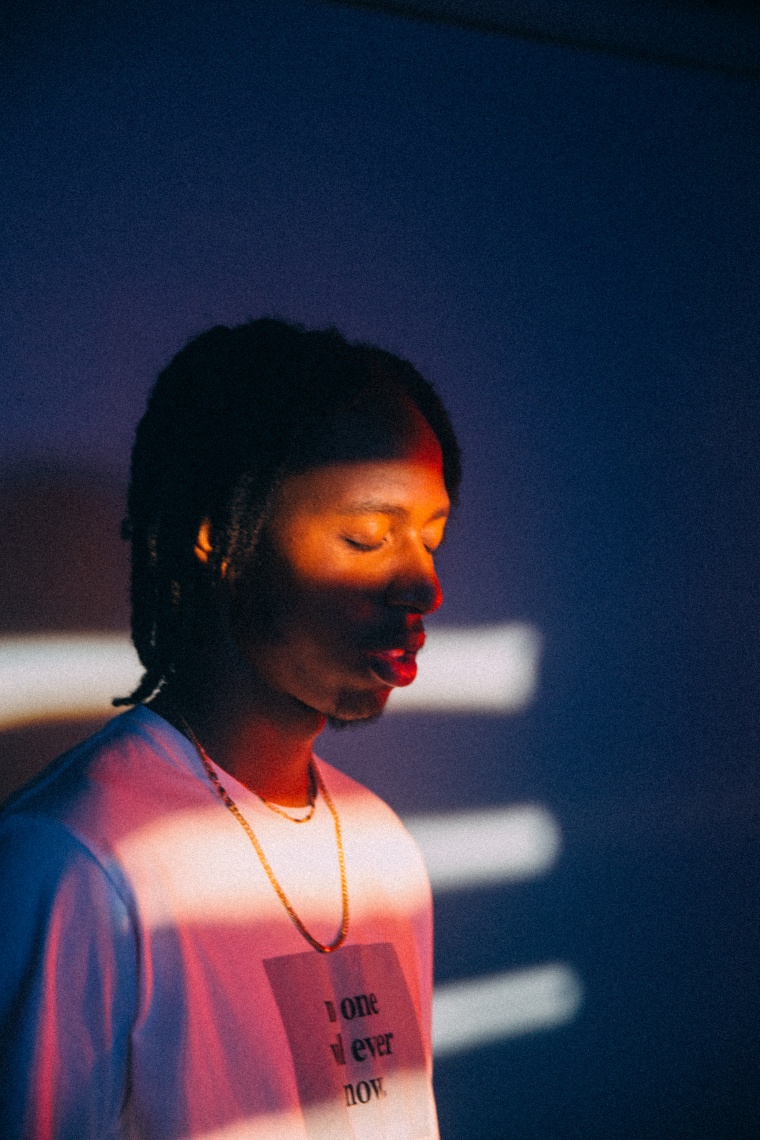 Photo: Alexandra Gavillet
Photo: Alexandra Gavillet
Christianity is rap’s reigning religion. There are countless songs about Jesus walking, praises going up and blessings coming down, and fiery screeds about eternal damnation. Still, there aren’t nearly as many raps about what happens when religious doubt is inescapable.
Poignant, dark, and candid, Ebenezer’s 53 Sundays is a subversive and jaded narrative about the lengths we’ll go to challenge a lifetime of organized religion and what happens on the journey back. Released in September, the album has the specific warmth and joy of the black church baked into its core. On songs like “Glory,” live instrumentation and a choir envelop Ebenezer’s stories of broken times and questions of whether God is ignoring his familial prayers. Over 13 tracks, the rapper-producer ponders his lost faith, claims he’s the realest since Jesus of Nazareth, and wonders if the Lord only works weekends. It’s a gospel album that’s strengthened by the courage to find one’s own truth in God, instead of blindly following dogma.
Ebenezer was born in Hackney, London to considerably religious Nigerian parents. When he was still a young child, his father was deported from the U.K., leaving his mother to work multiple jobs as he, his brother, and sister avoided immigration officials. The stress of that trauma formed the foundation of his relationship with religion.
“Growing up I just fell out of faith with religion. All the things that we had been through, all the trials and tribulations that we’re still going through today, how long have we been calling for help and have received nothing,” Ebenezer says. “We have to go and get it by any means necessary,..You just sit there on your thumbs and just pray, nothing is going to happen.” During a recent call, The FADER caught up with the artist to discuss the making of 53 Sundays, navigating the perils of the music industry, signing to Virgin EMI Records, and if he ever returned to the church after his year away.
On 53 Sundays, you tell the story of having to deal with immigration knocking on the door as a child. What was it like to put those stories on the album?
I just like to be as brutally honest as possible and it’s something that a lot of people can relate to, not only just in the U.K., but in the states or other countries — Germany, France. Immigration is looking to deport a lot of people — a lot of needy, good people. Not to say that immigrants are bad, but at the time, we were just struggling with immigration because my dad wasn’t around, because they deported my dad. So it was just my mom and three kids and my mom was doing her best to get by, was trying to work two, three jobs. Not the greatest paying jobs, so I’m trying to apply for like an indefinite stay, but then you had snitches trying to rat on my mom.
So we were always on the run and immigration one time raided a family’s house we were supposed to be staying at, ‘cause I definitely believe one of the suppose-to-be family members snitched. So immigration came, raided the house, but just missed us.
The album flirts between your faith wavering and mentioning God. Would you consider yourself a religious person, an atheist, or someone just figuring it out?
I wouldn’t consider myself an atheist. I do believe there is a God. However, with religion, I feel like it’s very contorted. I can’t specify if this is the correct religion to follow, cause I’ve always believed if someone is following a specific religion, whether it’s Buddhism, Hinduism, and things are going right for them and they’re a positive person and they’re doing well and they’re just a good person deep down, does it really matter what religion you follow? Like you have a good impact on the world. I don’t know if I would say that I’m religious. I respect religion. I really, truly respect it and the people who have faith in it and I’m trying to find my faith in religion again.
When did you have the concept for 53 Sundays? When did you realize this was a story you could tell across a whole album?
So, I was literally on the verge of quitting music ‘cause I was struggling financially, mentally, just holistically across the board. Had a conversation with one of my best friends, Tre Jean Marie, and then after I got off the phone with him I was working on someone else’s project and the idea, it came to me out of nowhere. Literally, like somebody boosted it in my ear and just gave me the idea of this song “53 Sundays” and after I made that song I’m like, Aight, I’m just going to tell the God’s honest truth, I’m not gonna hide it.
How important was your brother to you growing up?
My brother was everything. I wanted to be my brother. When he used to play soccer, I wanted to play soccer. When he started to rap, I wanted to rap. Coming from a West African background, their main focus is education. When I told my parents I wanted to do music, they’re trying to kick me out of the house, trying to beat me like, Yo, you’re going to university. You’re going to graduate. But I really wanted to pursue music and my brother literally had to physically fight for me to do music. My brother made sure that I was looked after, made sure I wasn’t on the streets at a time I shouldn’t be at. Even though with hand-me-downs, he made sure that I still had clothes to wear, like he put clothes on my back.
Have your parents turned around, seeing your success and seeing how far you’ve come as a musician?
To a certain extent, I would say yes. Like I just haven’t got to the point where I’m able to financially support my parents without them ever having to worry. ‘Cause they’re at that age where they’re supposed to retire from work and they shouldn’t be working no more. So I mean they’re happy for me that I’m doing what I love now and they see how much hard work and effort I put into it. I just feel like I haven’t got nothing to show for it, just yet. Not to say that I’m ungrateful for the position I’ve been given and how far I’ve come. It’s just what I want to be able to show for it is, Mom you don’t ever have to work anymore. Mom, that bills are taken care of. As for now, I’m still hustling.
Who have you written for, produced for, or just worked with in the studio?
Sometimes it’s been indirect where they would ask for a song like, “Do you have any songs for” and then I would send something I’ve done over. Jason Derulo cut one of my records with one of my best friends. Eric Bellinger, Ty Dolla $ign, Lyrica Anderson, Craig David, and there’s a few more that are going through right now, so I don’t want to say and jinx it. So I’m just kind of holding my tongue, but there are some more on the way. I worked with Jeremih, Kranium, that’s all I can think of off [my] head right now.
You said, “They offered me 20k, told me I should take it,” which is the first line on “What If.” Did a label really tell you that’s all your worth?
Yep. I’m not going to say the label.
What was going through your mind?
Because other people hadn’t heard of me at that point, they kinda wanted to snatch me up before anyone did. So they were just trying to shove it down my throat like, Yo, just take it. This is the only offer you’re going to get. I tried to fight it, tried to fight it, and then they bumped it up to 25k and I was like, Wow, that really isn’t much of a difference. After tax and after management commission, I’m barely going to see $10,000 and then I still got debts and bills I have to pay. ‘Cause my friends are paying my studio bills, ‘cause I never had no money. I was even willing to take it, because I never had a penny to my name. Talking to my friends was like, You’re worth more than that. Trust me, just stick it out. It’s not a matter of if, it’s a matter of when. I just had to keep my head down, grit my teeth, and not take the deal.
How did you go from a label only offering $20,000, $25,000 to being signed to Virgin and Interscope Records? What’s that process like?
Just having a good infrastructure around me, a good team that believe in me. That are willing to put their necks and their reputations on the line, in order for me to progress, to better my career and their career. I just have to trust and believe, because I always had issues with trust and paranoia due to so many factors, but I just had to let go and not let myself block my blessings. They just put the music in the right hands. The right people heard it and then they reached out themselves and was like, Yo, we love this. We want to be part of this. How do we become a part of this? And because the product was already there, they didn’t need me to almost make the product from scratch.
One of your biggest songs is obviously, “53 Sundays.” Did you start going back to church or is it something that you’re still ruminating on?
I went back to church a couple of times, but I’m still working on it. [laughs] I’m still working on it.

